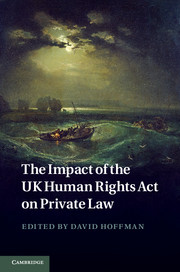Book contents
- Frontmatter
- Contents
- Contributors
- Foreword
- Preface
- Acknowledgements
- Table of cases
- Table of statutes
- Table of statutory instruments
- Table of European Union Legislation
- Abbreviations
- 1 Introduction
- 2 Mapping horizontal effect
- 3 Public authorities: what is a hybrid public authority under the HRA?
- 4 Statute law: interpretation and declarations of incompatibility
- 5 Precedent
- 6 Tort design and human rights thinking
- 7 Privacy: the development of breach of confidence – the clearest case of horizontal effect?
- 8 Nuisance
- 9 Defamation
- 10 Discrimination law
- 11 Damages: private law and the HRA – never the twain shall meet?
- 12 Property and housing
- 13 Commercial law
- 14 Restitution
- 15 Insolvency
- 16 Employment law
- 17 Civil procedure: Article 6 – a welcome boost to the development of English procedural law?
- 18 Conclusions
- Index
- References
14 - Restitution
Published online by Cambridge University Press: 05 November 2011
- Frontmatter
- Contents
- Contributors
- Foreword
- Preface
- Acknowledgements
- Table of cases
- Table of statutes
- Table of statutory instruments
- Table of European Union Legislation
- Abbreviations
- 1 Introduction
- 2 Mapping horizontal effect
- 3 Public authorities: what is a hybrid public authority under the HRA?
- 4 Statute law: interpretation and declarations of incompatibility
- 5 Precedent
- 6 Tort design and human rights thinking
- 7 Privacy: the development of breach of confidence – the clearest case of horizontal effect?
- 8 Nuisance
- 9 Defamation
- 10 Discrimination law
- 11 Damages: private law and the HRA – never the twain shall meet?
- 12 Property and housing
- 13 Commercial law
- 14 Restitution
- 15 Insolvency
- 16 Employment law
- 17 Civil procedure: Article 6 – a welcome boost to the development of English procedural law?
- 18 Conclusions
- Index
- References
Summary
The basic principle underlying autonomous causes of action for which the legal response is restitution may be appropriately summarised for the purposes of this chapter as the reversal of unjust enrichment, supplemented by some instances where restitution is a measure of damages rather than a cause of action. In common with many of the rights underlying private law, reversal of unjust enrichment is not one of the Convention rights. Therefore, the European Convention does not, in terms, mandate the reversal of unjust enrichment. Unjust enrichment does require there to be some factor which makes the transaction unjust and therefore liable to be reversed (for example, mistake, duress, failure of consideration, illegality), and there may be some cases where the factor which makes the enrichment unjust does engage or overlap with a Convention Right. For example, one can imagine a case of a payment obtained by duress where the duress involved sufficiently severe physical harm to engage Article 3 (freedom from torture), but to refer to Article 3 there does not necessarily add anything meaningful to the merits of the reversal of the payment.
The Article of the Convention that is most likely to be substantively engaged by an unjust enrichment case is Article 1 of the First Protocol (‘P1–1’), which protects rights to property (‘the peaceful enjoyment of…possessions’), because it may be engaged by the very act of reversing a transaction, and may therefore require consideration of whether the reversal is a justified and proportionate interference with the property right being reversed. Conversely, if the result of restitution is to undo a transfer of property, P1–1 could apply to support the claim for the return of property unjustly held. In that sense, it does not mandate an answer either way: where it applies depends on the underlying law relating to whether or not the transaction can be reversed.
- Type
- Chapter
- Information
- The Impact of the UK Human Rights Act on Private Law , pp. 321 - 333Publisher: Cambridge University PressPrint publication year: 2011



